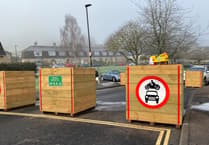In February of this year, one correspondent to the Journal’s letters pages made the point that “Our town maybe growing at a crazy rate but our high street is a breath away from death”. In his letter, Alun De Pughe, now a Midsomer Norton Town Councillor, set out seven ideas that he believed could reinvigorate the High Street and the research I’ve reviewed would suggest Alun’s very much on the right track.
The leisure experience sits at the heart of Alun’s regeneration philosophy. A research paper on Town Centre Regeneration, published by the House of Commons Library describes how “initiatives to support high streets have sought to recognise changing patterns of use and support resilience and diversification. This often means a move towards ‘multifunctional’ town centres with, for example, community and leisure offerings in addition to traditional retail”.
Another paper from the House of Commons Library, looking at the retail sector in the UK, explains that “what attracts people to the town centre or shopping mall is no longer just the shops (which have often been substituted by online vendors), but rather the leisure facilities that they can access there, such as cafes, restaurants, cinemas and children’s activities”. Alun’s observations about theatre and dance, skating festivals and live music provide exactly the right blueprint for Midsomer Norton to plot it’s way out of it’s current malaise and look ahead to a brighter future.
There is also a case to be made for his pedestrianised café culture, with the retail sector analysis by the House of Commons Library highlighting that “retailers are increasingly moving towards shops that provide experiences and services that cannot be sourced online (such as stylists, repairs, cafes) rather than simply browsing space”, a conclusion supported by Deloitte whose data shows that the top ten growing sectors involved experiential leisure services, such as personal grooming and socialising.
Even Alun’s observations about the Greenway cycle path are born out by the research, with Deloitte concluding that “consumers are setting apart time to engage in leisure activities with their social circles such as walking, cycling and playing sports, making the leisure sector well placed to provide a medium for promoting healthy communities and lifestyles”.
As pleasing as it is to see Midsomer Norton Town Council taking a strategic and collaborative approach to tackling the future development of the High Street, an aspiration it would appear that Alun and I share, it is imperative for local business owners to be doing their bit to deliver prosperity.
The Deloitte research talks about businesses needing to “focus on ethical engagement, being transparent when working with suppliers, being fair to their workforce, highlight the quality of their locally sourced products and communicate their safety measures, brand story and local heritage”. Easily said than done I grant you and whilst I appreciate that the finer points of free market economics aren’t to everybody’s taste, the long term economic success of the High Street must be driven by the business community and not a reliance on the intervention of the State.
The shopper survey I undertook with the Journal in 2017 highlighted the importance of good customer service, as well as the importance of online shopping, a phenomenon only amplified by the Pandemic. Even here High Street businesses can think about their offering, as I urged them to do five years ago. The Deloitte research highlighted that “24% (of consumers) would buy items online and pick them up in-store as they want to support local stores and workforce”, and when it comes to customer service, businesses need to understand, as Deloitte point out that “the high street appeals to consumers with more intimate, tangible experiences, whether it is the ambience in a physical store or the location in a popular urban centre”.
The other conclusions from my 2017 study considered the appearance of the High Street and the importance of signage, two themes that I’m pleased to see sit at the heart of the towns Heritage Action Zone, a project that has brought together over £2m of funding that seeks to “encourage sustainable economic and cultural growth in the town centre and nearby areas”. Through this project and the combined efforts of the Town Council, WECA, B&NES, the local business community and the research I have set out over three articles, brought together from multinational giants like Deloitte and esteemed sources such as the House of Commons Library, there is a clear case that leisure activities, shared experiences and services that cannot be sourced online, provides Midsomer Norton High Street with the road map it needs to secure it’s future economic prosperity.
IAN NOCKOLDS




